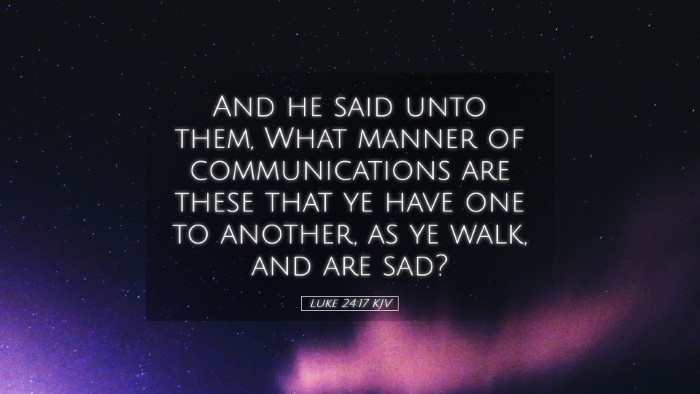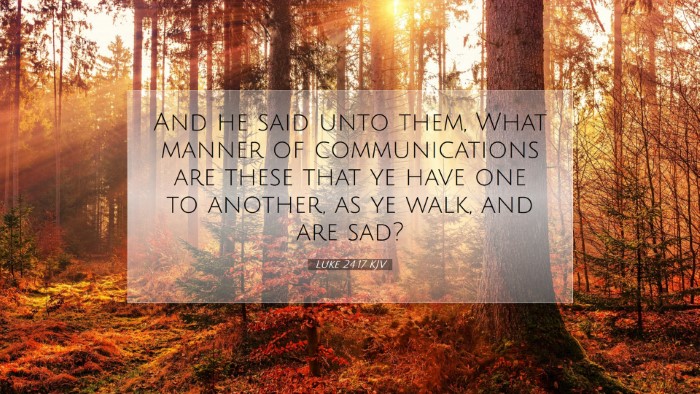Commentary on Luke 24:17
Bible Verse: "And he said unto them, What manner of communications are these that ye have one to another, as ye walk, and are sad?" - Luke 24:17
Introduction
The verse Luke 24:17 occurs in the narrative of the post-resurrection appearance of Jesus to two disciples on the road to Emmaus. This moment provides rich theological insight into the nature of Christ's resurrection, human grief, and the transformative power of divine encounter. This commentary synthesizes insights from public domain theologians such as Matthew Henry, Albert Barnes, and Adam Clarke.
Contextual Background
Prior to this verse, Jesus had risen from the dead, yet this event had not fully penetrated the hearts of His followers. The mood among the disciples was one of despair, showcasing a deep sense of loss and confusion regarding the events surrounding the crucifixion and the empty tomb. As they walk along the road to Emmaus, their discussion reflects their emotional state, highlighting their reluctance to accept the truth of the resurrection.
Verse Analysis
“What manner of communications are these”
Matthew Henry notes that Jesus, in asking this question, shows a masterful understanding of the human heart. He is not merely inquiring about their discussion; he is probing the depths of their sadness and confusion. This is a divine inquiry, inviting a more profound reflection on the state of their faith and understanding.
“that ye have one to another”
Albert Barnes emphasizes the importance of communication among believers, especially in times of trial. It reflects how human interaction can serve as a balm during distressing times. The discourse between the disciples becomes a pivotal moment in recognizing their spiritual condition, which Jesus patiently listens to before revealing Himself to them.
“as ye walk, and are sad”
Adam Clarke highlights the physical act of walking as symbolic of the journey of faith. The disciples’ sadness illustrates the stumbling block of grief and confusion in the spiritual journey. Jesus steps into their midst not to chastise but to gently guide them from despair to realization of hope.
Theological Implications
- The Nature of Grief:
The sadness of the disciples offers insights into the human experience of grief. These feelings, although valid, can obscure the truth of God's ongoing work in our lives. Like these disciples, believers today must recognize that sadness does not have the final word.
- Divine Presence in Disappointment:
Jesus approaches the disciples not in triumph but in the very moment of their despair. This shows the relational nature of God, who enters into our confusion and sorrow. It emphasizes how God meets us where we are, in our moments of doubt, to reveal truth and hope.
- Importance of Communication:
This passage reiterates the importance of dialogue among believers. Sharing our understandings and struggles forms a community of support that can illuminate the path to faith. The disciples’ shared sadness eventually leads to a powerful revelation through Christ.
Practical Applications
The insights gained from Luke 24:17 can be applied in numerous pastoral and scholarly contexts:
- Encouragement for Those in Grief:
Pastors can use this passage to provide comfort and hope to those experiencing loss. They can remind congregants that expressing sorrow is natural and that God is intimately aware of our struggles.
- Engaging with the Word:
This verse invites deeper engagement with Scripture. As students of the Word, individuals are encouraged to reflect on their personal doubts and struggles and to seek understanding through discussions with others.
- Fostering Community:
Church leaders can cultivate spaces for dialogue that address the complexities of faith, helping individuals process their emotions in a supportive community. The example of the disciples can be a model for open discussions of faith and doubt.
Conclusion
Luke 24:17 serves as a poignant reminder of the intersection between divine interaction and human experience. As we reflect on this text, we are urged to consider how our own conversations reflect our understanding of God and our circumstances. The journey to Emmaus is a journey we all share, and it bears a message of hope that transcends our moments of darkness.


